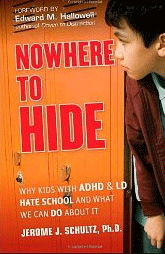“Nowhere to Hide: Why Kids with ADHD and LD Hate School and What We Can Do About It”

“Nowhere to Hide: Why Kids with ADHD and LD Hate School and What We Can Do About It”
By Jerome J. Schultz, Ph.D.
Jossey-Bass
San Francisco, CA, 2011
Book takes pragmatic, problem-solving approach
Reviewed by Paul Efthim, Ph.D.
Boston-area neuropsychologist Jerry Schultz has written a magnificent book on his innovative method for working with kids suffering from attention-deficit hyperactivity disorder, learning disabilities or both.
Schultz’s approach is built on the foundational assumption that students with undiagnosed LD or ADHD face chronic anxiety and stress stemming from continual frustrations in their academic and social environments. Not knowing why they have these difficulties, these students literally have “nowhere to hide” from their bad feelings and go into fight-or-flight mode in order to cope.
These behaviors can take the familiar form of acting out (fighting with teachers and family) or acting in (massive avoidance, anxiety, depression).
As the book’s subtitle suggests, these kids hate school because they associate it with failure, shame and stress. Schultz explains: “It’s not really the LD or ADHD that’s the problem – it’s the children’s reaction to their condition. It’s their reaction to the environment in which they are educated and their response to the reactions of others to the behaviors they exhibit because they don’t want to be seen as incompetent.”
Most of the popular ADHD/LD guidebooks talk about the role of stress and anxiety but few books help parents and professionals intervene in a sophisticated manner. Schultz’s book goes beyond the standard recommendations for stress management and relaxation training to get at the deeper, more complex ways that stress interferes with emotional and cognitive processing.
Schultz writes from a unique perspective as a practicing clinical neuropsychologist (based in Lexington, Mass.) who has also worked as a middle school special education teacher. Writing in a conversational tone, he walks readers through this complex territory with plenty of good humor and little jargon.
The book opens by describing the biology of stress and how it affects students’ brain function in and out of school. The second part addresses misconceptions about learning disabilities and ADHD and their relationship to each other. A chapter on neuropsychological testing shows what careful diagnostic assessment looks like from inside the testing room. Then, the author lays out his “DE-STRESS” approach that aims to help families and teachers inoculate students against stress and other forms of emotional interference to learning. In the final section, Schultz offers a superb chapter for teachers that deserves close reading by all classroom instructors and school administrators, followed by a section for parents and family members and an extensive list of further resources, rating scales and printable charts.
Given how LD and ADHD co-occur in about 30 to 50 percent of cases, this book stands out as one that addresses both conditions simultaneously. It offers a pragmatic, problem-solving, strengths-based approach that avoids pathologizing students while also refusing to sugarcoat the challenges involved in dealing with these conditions. Schultz offers a hopeful, inspiring tone and employs dozens of perceptive case examples that convey the emotional experience of living with LD or ADHD and also illustrate specific strategies that students, teachers and parents can use to overcome these obstacles.
One of Shultz’s key themes is the importance of empowering students by teaching them how their mind works in the context of stress and schoolwork. He counsels giving students extensive test feedback and building self-awareness, self-control and self-efficacy as bulwarks against anxiety and stress evoked by academic and social challenges. He offers wise counsel for teachers and parents to help facilitate these processes.
Worthy of the widest possible audience, this book will appeal to families dealing with ADHD and LD and will be especially valued by those who are considering or have completed a neuropsychological evaluation.
Paul Efthim, Ph.D. is a licensed psychologist in private practice in Brookline, Mass. He holds a faculty appointment at the Boston Institute for Psychotherapy and is a candidate at the Massachusetts Institute for Psychoanalysis.
Learn more about the book: Nowhere to Hide: Why Kids with ADHD and LD Hate School and What We Can Do about It [NOWHERE TO HIDE] [Hardcover]
